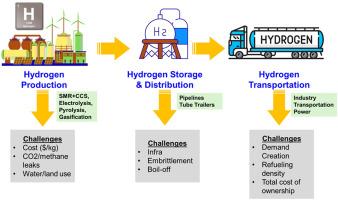改善氢经济的挑战和未来方向
IF 9.1
1区 工程技术
Q1 ENERGY & FUELS
引用次数: 0
摘要
氢作为一种通用的能量载体在全球能源转换中具有巨大的潜力。可再生和不可再生的氢资源都可以用来生产环境友好型氢。生物气化、蒸汽甲烷重整、电解和石化水裂解是最常见的生产方法。对氢的需求仍然主要是由石油提炼驱动的,包括汽车燃料电池应用在内,99%以上的燃料都是由石油提炼产生的。氢要成为一种合适的气候解决方案,就必须以化石燃料基础设施为基础。尽管存在这些挑战,但工业、交通运输和发电为氢经济提供了充满希望的机会。氢的生产、储存、分配和燃料利用的过程包括几个步骤。本文对氢的现状进行了全面分析,并讨论了其未来的发展轨迹,包括生产技术的进步、燃料应用、基础设施发展和几个行业的应用。从实验室规模过渡到大规模的商业氢气生产将需要大量的投资和合作。如果氢要充分发挥其在全球能源系统脱碳中的潜力,就必须对成本、基础设施差距和技术限制进行关键的讨论。本文章由计算机程序翻译,如有差异,请以英文原文为准。

Challenges and future directions to improve the hydrogen economy
Hydrogen has significant potential as a versatile energy carrier in global energy conversion. Renewable and non-renewable sources of hydrogen can be utilized to produce environmentally friendly hydrogen. Biogasification, steam methane reforming, electrolysis, and petrochemical water splitting are the most common production methods. The demand for hydrogen remains primarily driven by oil refinement, which produces more than 99 % of the fuel including automative fuel cell applications. For hydrogen to be a proper climate solution, it must be based on fossil fuel infrastructure. Despite these challenges, industry, transportation, and power generation present promising opportunities for the hydrogen economy. The process of hydrogen production, storage, distribution, and utilization for fuel involves several steps. A comprehensive analysis of the current state of hydrogen is presented here, along with a discussion of its future trajectory, including advances in production technology, fuel application, infrastructure development, and applications in several industries. It will take substantial investments and collaborations to transition from laboratory-scale to large-scale commercial hydrogen production. It is crucial to have critical discussions on cost, infrastructure gaps, and technological limitations if hydrogen is to realize its full potential in decarbonizing global energy systems.
求助全文
通过发布文献求助,成功后即可免费获取论文全文。
去求助
来源期刊

Renewable Energy
工程技术-能源与燃料
CiteScore
18.40
自引率
9.20%
发文量
1955
审稿时长
6.6 months
期刊介绍:
Renewable Energy journal is dedicated to advancing knowledge and disseminating insights on various topics and technologies within renewable energy systems and components. Our mission is to support researchers, engineers, economists, manufacturers, NGOs, associations, and societies in staying updated on new developments in their respective fields and applying alternative energy solutions to current practices.
As an international, multidisciplinary journal in renewable energy engineering and research, we strive to be a premier peer-reviewed platform and a trusted source of original research and reviews in the field of renewable energy. Join us in our endeavor to drive innovation and progress in sustainable energy solutions.
 求助内容:
求助内容: 应助结果提醒方式:
应助结果提醒方式:


